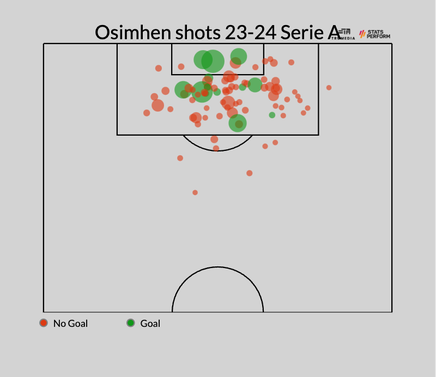It was as recently as January that Victor Osimhen seemed utterly certain what this summer’s transfer window would deliver for him.
“In times like this when you are one of the hottest strikers on the globe, you expect this kind of [speculation],” Osimhen told CBS Sports Golazo Network’s Morning Footy. “At the end of the season, I’ve already made up my mind.”
Everything seemed to be pointing to a big money move away from Napoli, surely one of the priciest deals in footballing history.
Perhaps Osimhen is blessed with particularly remarkable powers of foresight. Those would be required to envisage a scenario where Antonio Conte is the one tasked with righting the windswept Napoli ship. Not only that but one where one of the most widely admired strikers in the sport finds himself as something akin to a bargaining chip so his new boss can get ahold of an older, less effective center forward.
Talks between Napoli and Chelsea have rumbled throughout the summer with a view to securing the services of Romelu Lukaku for Conte. Now it has been suggested that that dialogue centers around Lukaku’s move to Campania being the permanent one while Osimhen, the man whose goals carried Napoli to their first Serie A title in 33 years, goes the other way on loan with an option to buy. A man who averages a goal every 125 minutes in Italy’s top tier, functioning as a makeweight in the transfer of a player five and a half years his senior, who scored two fewer goals than him last season while playing 600 more minutes. How has it come to this?
Osimhen’s agent Roberto Calenda has pushed back on that, saying that “imaginative exchanges … as if he were a package to be delivered quickly” show a lack of respect to the Nigerian international. “This package, however, is the top scorer of the third scudetto in Napoli’s history,” said Calenda. “Respect and stop with fake news!”
That would suggest that Osimhen himself is reluctant to be parked elsewhere on a temporary basis so Napoli can get Lukaku. Equally, the indications throughout the summer are that there is a deal to be done for anyone who wants to get hold of a player with 135 goals from 258 games for club and country.
Osimhen had long looked like the belle of this summer’s transfer ball. It was clear he was ready to go — no wonder after his club’s deplorable TikTok antics — and the contract he signed in December seemed to be little more than a setting of the terms of engagement with his suitors. Paris Saint-Germain were going to need a superstar forward to succeed Kylian Mbappe. At the turn of the year Arsenal seemed as if they were only a No. 9 away from going all the way in the title race. Given their need at the position, it was easy to see how Manchester United or Tottenham might find themselves in the mix for Osimhen’s services. Chelsea, to whom any teenager with two feet appears to be a market opportunity, could be counted into the equation too.
It is easy to suggest that the $140 million release clause in Osimhen’s contract has quelled his appeal. Certainly in an age where Premier League and UEFA financial regulations have proven themselves to be surprisingly robust, any nine-figure deal is going to be a challenge to execute. Equally, the word out of Napoli all summer long has been that their demands are more fluid than just getting the clause in full. It is no longer a case of pay up or we hang up.
What else, then, has kept top clubs from beating down Napoli’s door? Another injury-hit season will certainly have prompted questions in scouting departments. The 2,566 minutes (equivalent to 28.5 full matches) Osimhen registered in his Scudetto-winning season is by some distance the most he has delivered in a European league season. Since establishing himself with Lille in 2019-20 he has missed an average of 11 league games a season. Scroll through his injury history and there are an awful lot of muscular issues to fret about.

Then of course there is the fact that Osimhen has had years to build up that track record of injuries. No one knows exactly when 25 became, in recruitment terms, over the hill, but recent summers have seen an avalanche of deals in which wealthy clubs pay big money for someone younger in the expectation/belief/hope they might one day become an Osimhen. That, it is worth noting, is a striker who even in his down year averaged 0.54 goals, 0.52 non-penalty expected goals and 3.84 shots per 90 for a faltering Napoli. He gets good shots.
For a team moored in the Conference League, their route back to title contention seemingly an arduous one, picking up this sort of player in any deal that could fit around their PSR problems would be a triumph. Doing so while clearing the remaining two years of Lukaku’s contract (they would need to pick up a fee of around $50 million to book a profit on the Belgian) would be the sort of triumph to mitigate some of the missteps Chelsea have made in the market so far.
It simply should not be like this. Even those who foresaw a contracted, cautious market would have assumed some club somewhere would have concluded that Osimhen was the big money solution to their problems. Remarkably, it might be that Chelsea, so profligate in recent years, are in line to pick up one of the summer’s best bargains.












